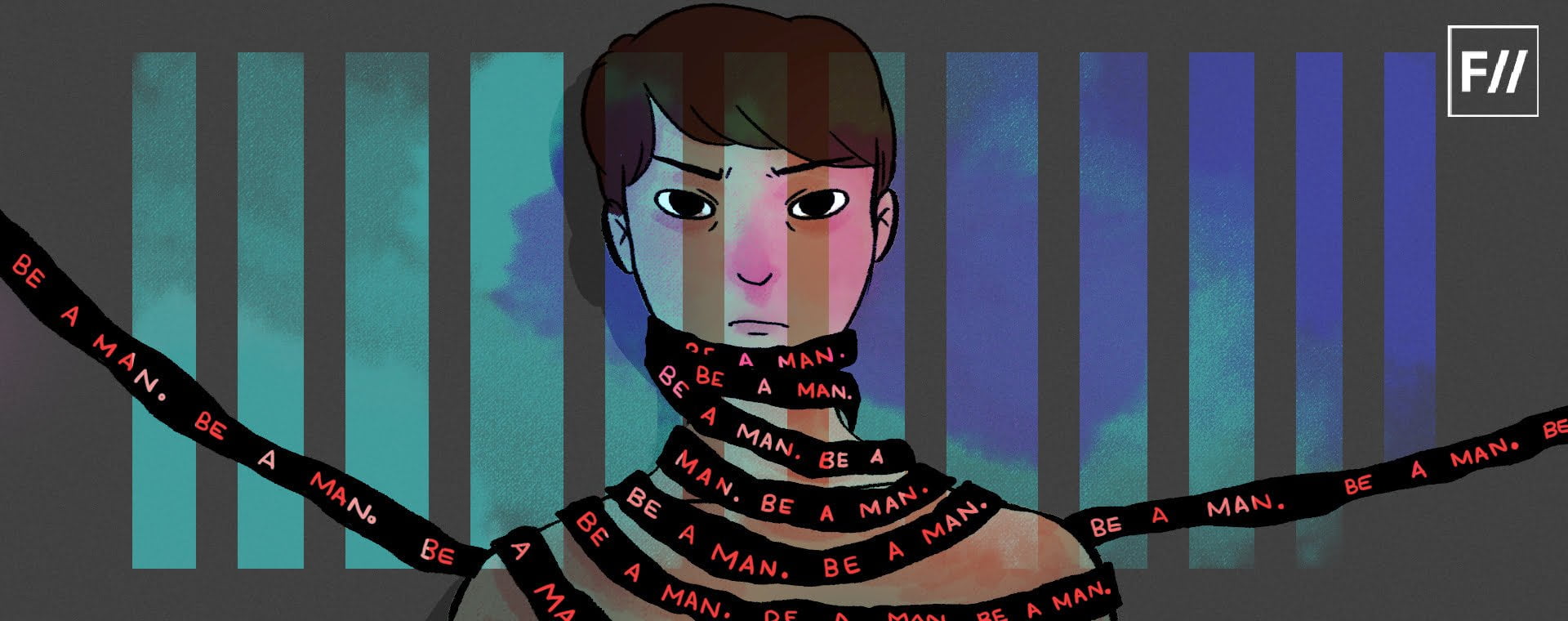Update: The article ‘I Am A Man And This Is How ‘Kabir Singh’ Is Damaging To Me‘ by Sagar Galani won the Laadli Media and Advertising Awards for Gender Sensitivity, 2020. Read more here.
Like many, I look to Hindi films as a source of entertainment and to understand different perspectives in complicated situations. Considering films like Kabir Singh, I should look for alternative sources. The Shahid Kapoor-Kiara Advani starrer is a beautiful film on the surface: stellar performances by the leads, beautiful cinematography by Santhana Ravichandran, and melodious musical scores written by Harsh Rameshwar. The team captures the essence of falling in love, losing love, and intoxication via alcohol and drugs. Despite strong technical elements, it was impossible not to cringe at the repetitive misogyny, glorification of masculine stereotypes, and lack of consent depicted in the lead relationship. I can’t speak for others, but I walked out of the film questioning what it means to be a responsible man.
Is it problematic to depict misogyny in movies?
Films are rarely neutral in their depiction of anything. In Kabir Singh, they have depicted misogyny that is real (that is not the problem), but with a positive undertone (this is the problem). About 25 minutes into the film, Kabir (Shahid Kapoor) sees his love interest Preeti (Kiara Advani) for the first time. A romantic background creates an environment that allows the audience to admire this blatant objectification. It guides the audience towards perceiving his subsequent actions as romantic and caring while being “strong” and masculine. He does the following:
1) He announces to a classroom full of boys that they’re not allowed to interact with this girl.
2) He barges into the girl’s classroom, asks her to sit in the front row and decides who she should be friends with so she can “perform better academically”.
3) He starts entering her classroom and taking her away to “private tuitions” on a field.
While Preeti softly admires these actions in the film, I can only imagine the trauma any woman would go through if faced by such blatant harassment in real life. Is it okay to depict this as a start to a “loving” relationship? In a world where raising men and women differently has become normalized in every echelon of society, it’s disappointing to see experienced professionals celebrate misogyny and harassment. Glorifying such actions only encourages others to imitate this behavior; it’s deeply irresponsible.
Are we really, in 2019, watching a film glorifying the misogyny, aggression, and non-consensual relationships that characterize toxic masculinity?
Can rational men be influenced to normalize aggressive behavior?
The first 20 minutes of the film are devoted to establishing Kabir’s character. We’re introduced to the following qualities:
He’s sexy: Girls are down to sleep with him, but he won’t shy away from threatening a girl with a knife in case she changes her mind during the act.
He’s smart: He performs surgeries with ease, but he may be drunk on rum when he performs them.
He’s athletic: He’s a skilled goalkeeper, but if provoked, will thrash members of the opposing team while facing minimal to no consequences.
Glorifying such actions only encourages others to imitate this behavior; it’s deeply irresponsible.
I only wish filmmakers would take responsibility to realize that as a young male viewer, I look up to the male protagonist’s actions. Despite recognizing how problematic his actions were, I couldn’t help but yearn for the command he had over his life: he takes what he wants, and no one wants to mess with him. The messaging I’ve received throughout my life is that I’m a man, that I’m the provider, and that I am entitled to get what I want.
In times when I’m insecure and feel like I don’t have that command over my life, it’s so easy for me to watch movies like this one and blame my issues on the fact that I don’t engage in such behavior. Even as a young man who believes deeply in the innate equality and agency of women, I subconsciously get one step closer to normalizing threatening a woman who won’t sleep with me, just because a commercial movie with an attractive lead told me I could.
Am I solely responsible for major decisions involving my partner?
As a man, should I be dictating the actions and decisions of my partners? If I am to buy in to the narrative of the film, my answer would be a “yes.” I should be operating under the assumption that I know better than my partner and should protect her from her inherent incompetence.
After Preeti gets a “deep” cut on her foot 45 minutes into the film, we see Kabir deciding that Preeti can’t take care of herself. Without any discussion with her, he decides she must move into his dorm so he can help her study. Of course, this move results in less studying and more intimacy for the two of them. Kabir makes countless decisions on her behalf that are shown to have a positive impact on both their academic and personal lives.
Also read: Bollywood’s Tryst With Toxic Masculinity
In Kabir Singh and in many other Hindi films, a perfect relationship has a very specific definition. We’re constantly shown that a responsible, “masculine” man will make the important decisions for his female partner and protect her from any harm, even if that means stripping her of her agency to consent. I can’t help but reflect on my own relationship. Have Hindi films shaped my belief of what my responsibilities are? Perhaps I do interrogate my girlfriend about “how she’s going to reach home” too often. Maybe I am operating under the assumption that as a boyfriend, I know more about how to “protect” my partner (a bias that I should work toward eliminating).
We’re constantly shown that a responsible, “masculine” man will make the important decisions for his female partner and protect her from any harm, even if that means stripping her of her agency to consent.
I’ve never believed films are required to be an ethics lesson for their audiences. I’ve always believed that imperfection in characters is what makes films truly beautiful. While I still believe this, Kabir Singh made me realize that films are equally responsible to not openly laud and glamorize incorrect behavior. Are we really, in 2019, watching a film glorifying the misogyny, aggression, and non-consensual relationships that characterize toxic masculinity? Are people genuinely entertained by such films? The answer is a resounding yes: the film earned 100 crores in 5 days.
Also read: Kabir Singh: The Poster Boy For Toxic Masculinity
As members of society committed to dismantling rigid gender norms, we need to interrogate what message is sent by films like these to young men in audiences across India.
Featured Image Source: IndiaTV News
About the author(s)
Sagar Galani's writing focuses on gender inequality and toxic masculinity in Indian media and society. He currently works in Mumbai in real estate and hotel development. He has completed his Bachelors in Applied Economics from Cornell University. In his free time, you can find Sagar performing improv, diving or reading about personal finance.





This was really insightful I really agree with you.People might say it’s a flawed charachter it’s art and cinema but the character was glorified unnecessary.
I like ur article!!! Nicely written.
I enjoyed watching the character of kabir singh and gabbar Singh n many others… There is no such thing as hero in movies anymore… But Actors… Enjoy the movie without making idols from bollywood… They are just entertainers they don’t take responsibility for one’s life. It will be stupid to follow the character in real life.
and had it been a Hollywood film……all these critics would have been praising it in their columns………..
Excellent article. I completely agree with the view point. In fact the entertainment industry should actively engage in distancing itself from such behaviour. As much as it is required to empower women to not only take their own decisions but also be responsible for your decision and your own safety, physically and financially. It is equally (if not more) required to encourage men to respect boundaries
and consent during interaction with women. It is also necessary to blur gender roles or behaviour. The message needs to be that a caring male need not be dominating.
Totally agree, Sagar. Media doesn’t realise what an impact it has on its viewers. Long time ago, the hero was always good and against all bad. That was positive influence. Now in the name of ‘showing reality’ media is glorifying things that are better left unsaid. All forms of media should be responsible enough to understand the consequences of their creations ’cause not every viewer is wise enough to realise it’s just show business. Showing goodness in a profitable way is the challenge before you media. Try doing that for a change?
If your life decisions are derived from cinema, then stick to UA certified movies. You are not grown enough to decide what’s wrong and what’s right, and what should be take away.
Stop writing, if you don’t know Joker was way much better than Batman in The Dark Knight, still nobody wants to become Joker.
Being your man or woman has nothing to do with your kiddish point of view. We are an equal society now, stop encouraging or playing victim.